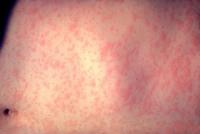-
UN agency launches new vehicle to fund antimicrobial resistance
The Food and Agriculture Organization (FAO) of the United Nations (UN) has launched a new funding vehicle meant to accelerate the response to rising global rates of antimicrobial resistance (AMR). The AMR Multi-Partner Trust Fund was developed through the joint efforts of the Tripartite—the FAO and sister UN agencies the World Organization for Animal Health, and the World Health Organization.
-
-
New technology to measures WMD threat exposures
Researchers are looking to find molecular signatures in blood that identify previous exposures and time of exposure to materials that could be associated with weapons of mass destruction (including infectious agents, chemicals, and radiation). The epigenome is biology’s record keeper, and Epigenetic technology will provide a new tool in the fight against the proliferation of weapons of mass destruction.
-
-
Religion and vaccine refusal are linked. We have to talk about it.
As measles cases have surged across the US and Europe this year, there’s been a lot of talk about what’s causing the outbreaks. Among the most discussed issues: mistrust of the medical establishment, populist politics fueling vaccine doubt, and the spread of misinformation on social media. A comprehensive survey found that people in higher-income countries were among the least confident in vaccine safety — particularly in North America and Europe. Meanwhile, vaccine trust was highest in countries where preventable diseases still spread, such as Bangladesh and Rwanda. So the further people are from outbreaks, and the more distant the memory of diseases like whooping cough and measles, the more likely they are to shun vaccines. Julia Belluz writes in Vox that the survey also uncovered something that unites some of the communities where outbreaks have been spreading lately, and it’s not as easy to talk about: religious belief.
-
-
No exceptions: New York, Washington, Maine abolish religious exemptions for measles vaccine, California looks to limit medical exemptions
The measles outbreaks that have spread through different parts of the country this year are causing lawmakers and advocates in several states to rethink their policies about vaccinations, despite ongoing skepticism and sometimes-fierce political pushback from anti-vaxxers. Laura Fay writes in t74 that New York, Maine and Washington state have all taken steps to restrict vaccine exemptions based on religious beliefs this year, and California is considering a measure to tighten up its existing policy governing medical exemptions.
-
-
A first: Salmonella resistant to antibiotics of last resort found in U.S.
Researchers have found a gene that gives Salmonella resistance to antibiotics of last resort in a sample taken from a human patient in the U.S. The find is the first evidence that the gene mcr-3.1 has made its way into the U.S. from Asia.
-
-
NY State: Religious grounds no longer allowed to exempt children from vaccination
New York is the latest state where parents can no longer refuse to vaccinate children on religious grounds. Both houses of the New York State Assembly passed the measure Thursday and Governor Andrew Cuomo signed it immediately.
-
-
Texas vaccine exemption rates have reached an all-time high. Did Texas make it too easy for parents to opt out?
Texas has resisted recent attempts to change its vaccine laws, allowing parents to get their children exemptions for “reasons of conscience.” Use our lookup tool to see how exemption rates have changed in school districts and private schools across the state.
-
-
Congress passes legislation authorizing critical biodefense programs
Last week the House passed the Pandemic and All-Hazards Preparedness and Advancing Innovation Act. The bill reauthorizes existing statute governing public health efforts at the Department of Health and Human Services (HHS).
-
-
Ebola outbreak spreads to Uganda – it should never have happened
The DRC is where the Ebola virus was first discovered in 1976. And the country is no stranger to this menace – this is the ninth time it has had to contain the disease. Still, this outbreak is the second largest on record – and the second to have crossed into another country.
-
-
As measles cases crack 1,000, a look at what to do
Measles was declared eliminated in the U.S. in 2000, but by early June, the U.S. Centers for Disease Control and Prevention reported 1,022 cases in 28 states, the most since 1992. The disease is occurring in clusters of unvaccinated people who, for religious, personal, or medical reasons, have refused to be vaccinated or to have their children vaccinated. “What we haven’t seen before — or at least it’s much more intense now — is the extent to which a foreign power, Russia, is utilizing the sense of division in our country, using social media, websites targeting low-information communities, isolated communities, to propagate an unhealthy status for Americans, says a national security expert.
-
-
Experts urge vaccination as U.S. measles cases top 1,000
Federal officials yesterday said U.S. measles cases have reached 1,001, the first time since 1992 that cases have been in quadruple figures, while experts continued to urge vaccination and underscored the safety of the vaccine.
-
-
Climate change already affecting global food production—unequally
The world’s top 10 crops — barley, cassava, maize, oil palm, rapeseed, rice, sorghum, soybean, sugarcane, and wheat — supply a combined 83 percent of all calories produced on cropland. Yields have long been projected to decrease in future climate conditions. Now, new research shows climate change has already affected production of these key energy sources — and some regions and countries are faring far worse than others.
-
-
Possible European origin of the Spanish Influenza

What happens when a military historian and a virologist get together to discuss the 1918 pandemic? What you get is a fascinating insight into a possible European origin and all sorts of things we may have overlooked.
-
-
U.S. measles cases top record, putting measles elimination status at risk

The U.S. Centers for Disease Control and Prevention (CDC) said Thursday that 971 cases of measles have been reported this year, topping the 1994 modern-record level, and it warned that the United States could lose its measles elimination status. Amid the growing measles crisis, the conspiracy-fueled anti-vaccination campaign of misinformation continues unabated on social media. DHS mulls a travel ban on measles-infected individuals.
-
-
The U.S. drinking water supply is mostly safe, but that’s not good enough

Most Americans take clean drinking water for granted as a convenience of modern life. The United States has one of the world’s safest drinking water supplies, but new challenges constantly emerge. As a scientist specializing in water quality, I believe water providers and regulators can’t afford to be complacent.
-
More headlines
The long view
Ransomware Attacks: Death Threats, Endangered Patients and Millions of Dollars in Damages
A ransomware attack on Change Healthcare, a company that processes 15 billion health care transactions annually and deals with 1 in 3 patient records in the United States, is continuing to cause massive disruptions nearly three weeks later. The incident, which started on February 21, has been called the “most significant cyberattack on the U.S. health care system” by the American Hospital Association. It is just the latest example of an increasing trend.
